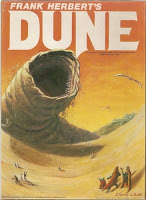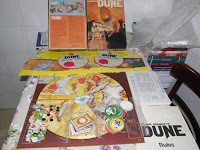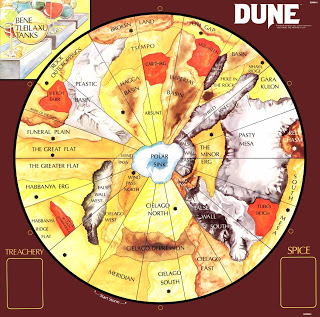When I was in high school, Avalon Hill’s “Dune” was one of our standard go-to wargames. We must’ve played it a hundred times, and one of the best things about it was that it never got old. In fact, I played the game before I had read the books, and I credit it with getting me to read one of the finest works of science fiction ever written.
There are six factions competing for control of the planet Dune; the Emperor, House Harkonnen, House Atreides, The Guild, the Bene Gesserit, and the Fremen. There are a certain number of cities on the board, and capture of either three or four (depending if you are attempting to win singly or as part of an alliance with another player) signals the end of the game. There are a limited number of troops that each faction can deploy, and combat is handled with a combination of troops sacrificed, leaders used, and spice (money) spent. Cards can be played in both combat and other situations, which gives a nice randomness to the flow of the game, but one which is mitigated by some of the special powers each faction possesses. Spice (money) appears randomly in certain spots on the board, and some factions are in a better position to collect it, either by virtue of their special powers, or by which cities they hold.
Those special powers are what make the game so eminently playable. It is absolutely perfectly balanced, even though the different factions have what seem to be wildly differing powers. The Emperor gets the money bid on cards by the other players, and has access to his Sardaukar troops, which are special units worth double in combat. He has the disadvantage of not starting the game with any troops on the board, however, and it is possible for the other players to cooperate to thwart his money-making abilities, by not bidding high amounts of spice for the cards. The Harkonnens can hold double the number of cards, can have a high number of other players’ leaders as their own traitors, and start with one of the key cities on the planet. And so forth. Each faction has powers specific to itself, as well as powers that can be used only when they are allied to another player– for instance, if you’re allied to the Harkonnen, all their traitors can win battles for you, too.
Perhaps the most devastating power is the Bene Gesserit’s ability to predict the winner. By clever and subtle play, they can manipulate the player of their choice to win on a particular turn. If they predict successfully, they win instead! I’ve seen it happen more than once, and it’s devastating when you’re the one they’ve predicted.
It’s exquisite balance makes this a timeless classic that has unfortunately been lost in the spate of recent games. It’s unfortunately out of print, and a quick check of eBay shows that copies are in around the $100+ range. If you’ve got a regular stable of friends who play board games, however, I’d say it was worth it, regardless of whether you get the original cover or the later one with Sting (who played Feyd Rautha in the David Lynch film). Forget the two expansions, however; The Duel and Spice Harvest. They add nothing but a few new cards that do not, in and of themselves, really add anything necessary to the game.
In the course of preparing this post, I did stumble across this web site, which might be of interest to those looking to see the details about the game, with images of the cards and other pieces, a copy of the rules, the board, etc. Ahem.
There is, however, an issue of The General with alternate rules for a seventh faction; the Bene Tleilaxu. I’ve played with those, and they work really well, with the BT being very well balanced in the tradition of the original. You’ll also find that on Colin’s Dune Page, linked above.












Your readers may find this to be an acceptable method to sample this great out of print title.
http://www.boardgamegeek.com/boardgame/42617/dune-express
I also played a lot of Dune in high school, sometimes three games in a row on a Saturday afternoon. We alternated with Divine Right.
Jealous – I played a number of this game's peers back when it was released but this wasn't one of them and I really didn't get turned onto the books until the 1984 David Lynch movie.
I remember playing this game when I was in middle school, in the middle of summer with 2 or 3 other friends on a card table we set up in the garage.
It is a tremendously fun game that I, unfortunately, haven't played since my youth. I'm lucky enough to still have that game in my board game collection, along with the Descartes reprint (French rules with English translation).
Like you, I played the game before ever reading the novel.
I agree with this write up. It truly is an amazing game design that follows the books. I didn't like the movie though.